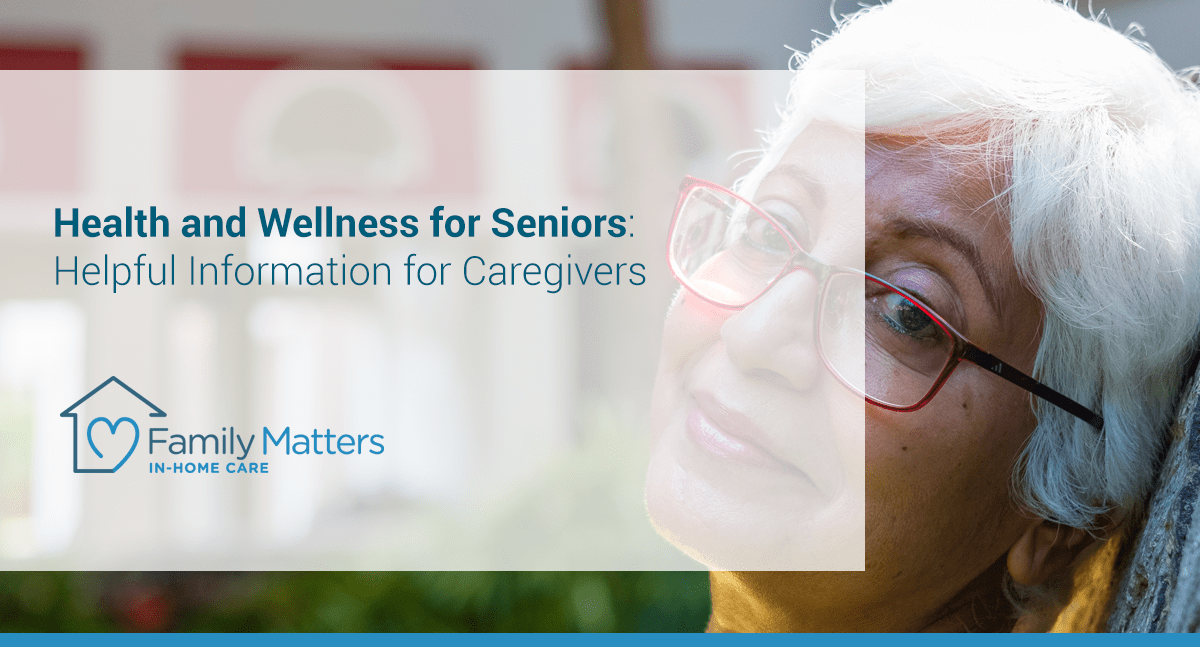
Health and Wellness for Seniors: Helpful Information for Caregivers
Caregivers can play a large role in helping seniors maintain their health with proper nutrition, exercise and other lifestyle habits. Here’s some helpful information for caregivers to help seniors maintain proper health and wellness routines.
Nutrition
It is extremely important for seniors to practice good nutrition. Poor nutrition affects the body, but also affects the mind, energy levels, and can lead to other health issues. The more caregivers know about nutrition for seniors, the better they will be able to care for them.
Tips to making meals and snacking easier:
- If the person has a hard time using a knife and fork, serve finger foods. Try bite-sized pieces of sandwich, meat, or cut-up fruit or veggies.
- Serve one or two foods at a time. Too many choices can be overwhelming.
- If chewing or swallowing is a problem, mash, puree, or moisten foods with broth, sauce, or milk.
- Add flavor to meals with spices and herbs.
- Put out bowls of nuts and fruit to encourage snacking.
- Serve nutritional supplement drinks or smoothies with protein powder and fruits.
Vitamins/Supplements
As a person ages, some nutrients become more important, such as:
- Fiber to stay regular
- Potassium for blood pressure and to help avoid fatigue and depression
- Healthy fats to lower chances of heart disease
- Vitamin B12 for energy and brain function
- Vitamin D and Calcium for bone health
Vitamin and Mineral Intake Guidelines for Seniors
- Vitamin B12—2.4 mcg (micrograms) daily. Some foods, such as cereal are fortified with B12. Up to one-third of older adults can no longer absorb natural vitamin B12 from food.
- Calcium—1200 mg (milligrams), but not more than 2500 mg per day. As people age, they need more calcium and vitamin D to keep bones strong. Bone loss can lead to fractures in both older women and men.
- Vitamin D—400 IU (international units) for people ages 51 to 70 and 600 IU for those over 70.
- Iron—Men and postmenopausal women need 8 mg of iron per day. Extra iron may be necessary for women past menopause who are using hormone replacement therapy. Iron helps keep red blood cells healthy.
- Vitamin B6—1.7 mg for men and 1.5 mg for women daily. B6 is needed for forming red blood cells and to keep overall health.
Exercise
Benefits of Exercise in Older Age
- Increases mental capacity. Research links physical activity with slower mental decline. Exercise increases blood flow to all parts of the body, including our brain.
- Prevents disease. Exercise is beneficial in preventing dementia and Alzheimer’s disease. Exercise can also delay or prevent many diseases associated with aging, such as diabetes, colon cancer, heart disease, stroke, and more.
- Improves healing. Injuries can take longer to heal as people age. Regular exercise may speed up the wound-healing process by as much as 25 percent.
- Increases balance. Exercise can help improve balance, which can help prevent falls. Falls are a major cause of broken hips and other injuries that often lead to disability and hospitalization in older adults.
Help Seniors Become More Active
- Finding something they enjoy doing
- Make sure it is geared to their fitness level
- Start at a level they can manage and work their way up slowly
- Do exercises at home with them. You can rent videos at the library and modify as necessary
Weekly Exercise Routine for Seniors

According to the AARP, 40% of people between 45 and 64 are considered sedentary. At age 64 and older, that number jumps to 60%.
With a proper plan, caregivers can help seniors maintain their health with proper nutrition, exercise and other lifestyle habits.
If you or your family member is considering in-home care as part of a plan to age in place, contact Family Matters In-Home Care today for a free consultation. Our team is dedicated to supporting your family and helping older adults enjoy life in the comfort of their own home for as long as possible.
Some of the services offered by Family Matter In-Home Care include: Alzheimer’s & Dementia Care, Bed & Wheelchair Transfer Assistance, Companionship, Housekeeping & Meal Preparation, Personal Care, Recovery Care, and Transportation.
Serving the San Francisco Bay Area and Greater San Diego, Family Matter In-Home Care has offices throughout California including: Campbell, CA, Roseville, CA, San Marcos, CA, and San Mateo, CA.
Sources:
- https://cdn2.hubspot.net/hubfs/1708580/Marketing%20Monthlies/PDFs%20from%20Windfarm%20Marketing/0117-HealthWellness.pdf
- http://www.agingcare.com/
- http://www.healthline.com/health/everyday-fitness/senior-workouts#ExercisePlan1
